Most children are afraid of something. Fears can be insignificant complicate the life of a child and his parents.
Children's fears have their own kinds and reasons for which they arise, and the peculiarities of their manifestation are impossible not to notice.
What are the most common?

Children, like most adults, experiencing certain fears.
From the age of two, the child will experience a feeling of fear, for whatever reason he feels fear of certain things.
Most common are:
- fear of the dark;
- fear of confined spaces;
- fear of sleeping alone;
- fear of household appliances;
- fear of water;
- fear of animals;
- fear of clowns;
- social fears;
- fear of death and many others.
Top 5 fearsYour baby may have:
Where do they come from?
Psychology of causes:
- Imagination. Most fears "come to light" thanks to a rich imagination. Children have much more fantasy than adults. Older people can distinguish fiction from reality, and the child is hard to do. Own fantasies that draws the imagination, seem real and frightening.
- Happening. It happens that a child begins to fear something after something has happened to him. For example, bitten by a dog. After that, the child begins to fear all the dog in a row, even the most innocent.
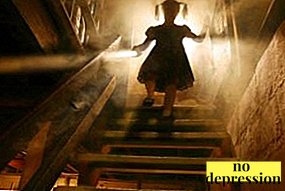 Suggestion. Often, parents can be too emotional to inspire something to the child. For example, that in no case you can not pick up a hot cup, otherwise there may be a burn.
Suggestion. Often, parents can be too emotional to inspire something to the child. For example, that in no case you can not pick up a hot cup, otherwise there may be a burn.Parents are so intimidated by this child that he can fall into a real tantrum when he is offered a cup of warm tea. And parents will shout and wonder why so scared their child.
- Conflicts in the family. The study showed that in the family where there is a huge amount of conflict, children experience fears more often than in the one where everything is peaceful and safe.
A child with a rich imagination can have a huge amount of fear.
What are children afraid of at different ages?
Age segments and types of fears appearing during this period during this period:
- Up to 6 months. During this period, children are most afraid of harsh and loud sounds, as well as sudden movements of those around them.
- From six months to a year. This period is also characterized by the fear of loud and new sounds (the sound of a vacuum cleaner, noisy places, loud music).
At this time, the child may experience fear of strangers, a change of scenery, a huge crowd of people.
- 1-2 years. Previous fears may not disappear, but new phobias may be added. This age is characterized by fear of the dark, the child can be taught to sleep alone in his room, so he may be afraid to fall asleep alone. Also, the child is afraid of various injuries, he begins to move more, all the time falls and hits, so such fear may appear. Fear of losing parental support.
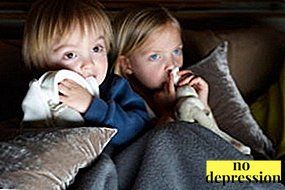 2-3 years. The child is still afraid of losing parental support. Fear of natural phenomena such as thunder and lightning. If during this period the child is tormented by nightmares, then he may be afraid to sleep.
2-3 years. The child is still afraid of losing parental support. Fear of natural phenomena such as thunder and lightning. If during this period the child is tormented by nightmares, then he may be afraid to sleep.- 5-7 years. At preschool age, the child begins to realize that everyone will die sooner or later. He panics begins to fear death (parents and loved ones, his own). Also during this period there is a fear of various monsters and monsters.
Closer to how to go to school, the child begins to pursue school fears.
- 7-8 years. Everything that children fear during this period is usually associated with school. They are afraid of being late, doing something wrong, poor grades, the fact that the teacher will scream, ridicule classmates.
- 8-9 years. Fear of failures in school and extracurricular activities. Fearing that someone will notice.
- 9-11 years old. The previous fear persists. There may be fear of hooligans, alcoholics and others. Fear of some living things (dogs, spiders).
- 11-13 years old. Adolescence is one of the most difficult. The child is afraid to seem stupid, ugly, ridiculous in front of peers and older people. Fear of death may increase.
How do adults help a child acquire new fears? The psychologist will tell about parental mistakes:
What is dangerous for a child phobia?

Fears almost never don't just disappear.
If the child is afraid of something, then you need to solve this problem.
After all, fear will only get worse and it will be harder to get rid of it. Ordinary fear can go into phobia.
If you do nothing, the child can become very nervous all the time. get hysterical. He will become too shy, peers can laugh and mock him and his fears. All this will grow into self-doubt.
Childish fears, if left untreated, can turn into adulthood. In this case, it will be much more difficult to deal with them.
Picture and the study of fears in the classroom with a psychologist:
Diagnostics and psychoanalysis
When parents pay attention to the fact that their child is afraid of something and this greatly complicates his life, then in that case seek help from a psychotherapist.
The specialist will conduct a number of special diagnostic methods that will help determine what exactly the child is afraid of and what reasons lie in his fear.
- Drawings: A child will be asked to draw a picture on a specific topic, for example, about a family, or on any topic that your child likes. There is a special method for decoding children's work, it is with the help of her specialist that she will determine what specifically bothers the child.
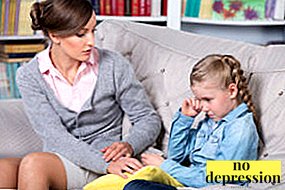 Tests: for children and their parents conduct tests that help to identify what fears haunt the child, the level of his self-esteem, whether he is anxious, etc.
Tests: for children and their parents conduct tests that help to identify what fears haunt the child, the level of his self-esteem, whether he is anxious, etc.- Observation: Parents are invited to carefully observe their child, for example, for several days or a week. See how and with what he plays, pay attention to his behavior in certain situations.
There are several signs of anxiety (tearfulness, anxiety, sleep problems, convulsions, difficulty concentrating), if at least one child has a manifestation, you should definitely inform the doctor.
- Fairy tales: with the help of fairy tales, you can determine what the child feels. You need to read the kid a story, and then ask questions related to the plot of the story.
The answers will show what the child fears and fears, what relationships in his family, what worries him most.
- Questions: You can ask questions that specifically concern parents (if the child is afraid to sleep alone, is he afraid of the dog, etc.). Answers to these questions will help identify the problem.
Characteristics of fears in children and 5 ways to overcome them:
How to help your child overcome fear?
How to cure fears? Work on the correction occurs in several stages:
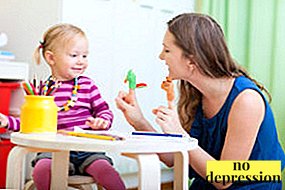 Stage I - parents or teachers of a child apply to a psychologist with a request for diagnosis;
Stage I - parents or teachers of a child apply to a psychologist with a request for diagnosis;- Stage II - using special techniques, the psychologist works with the child and his parents;
- Stage III - consideration of the results and their discussion with parents. The methods of correction are determined by which work with the child will be carried out;
- Stage IV - carrying out remedial work;
- Stage V - discussion of the results of therapy. A re-diagnosis may be indicated.
Therapy helps to remove fears:
- Game therapy: element of the game is very important in the life of children. With the help of the game you can help your child survive certain events. Special psychotherapeutic games will help to gain self-confidence and overcome fears.
- Fairy tale therapy: fairy tales with a specially selected plot will help the child to become more courageous and strong. But if fear causes a specific fairy-tale character, then it is better to refrain from reading. Before bed, it is better to read only kind and positive books to the baby.
- Art therapy: it can be drawing or modeling. All that the child can cope with and with which he will be comfortable working will fit. This therapy will give way to emotions that have accumulated inside.
A child can paint his fear on a piece of paper and then tear it. So he will take the first step to overcoming his fear.
It will be more effective if all correction methods are applied. But you can work with one specific technique.
Psychology tips
What to do, if:
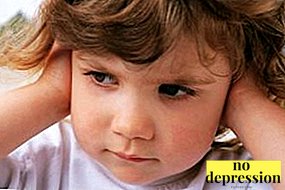 the child is afraid of sounds: make it clear to the child that there is no danger; show the source of the noise, study it with the baby; more often include calm music; do not teach the child to fall asleep in silence, you can turn on the TV, then the baby will not be afraid of even the most insignificant sounds; during the time of noise to behave naturally, it will make it clear that there is no danger; talk more often with the child;
the child is afraid of sounds: make it clear to the child that there is no danger; show the source of the noise, study it with the baby; more often include calm music; do not teach the child to fall asleep in silence, you can turn on the TV, then the baby will not be afraid of even the most insignificant sounds; during the time of noise to behave naturally, it will make it clear that there is no danger; talk more often with the child;- the child is afraid of zombies: to protect the child from all where the zombies are present as a character (books, computer games, movies); tell that the zombie does not exist; try to talk, because the child may not be afraid of the zombies, but of the one whom he draws in his imagination in this image;
- the child is afraid of being alone: begin to leave the child for a short period, for example, about 20 minutes, adding time each time; be sure to tell where you are going and what time you return; leave a telephone for communication; for this period, you can give the child an occupation, for example, to read a book, then the time for him will pass much faster; do not leave the child in the dark; make it clear that staying home is safe; You can give your baby a pet, then it will not be so scary for him to stay at home alone;
- the child is afraid to sleep alone: come up with rituals that will occur every day before bed (for example, watching a cartoon, washing, bedtime); give the child his favorite toy with which he will sleep; you can turn on the night light; bedtime reading of good tales;
- the child is afraid of other children: teach your child to solve conflicts; help to gain self-confidence; always maintain and be near;
 the child is afraid of the teacher: at school it often happens that teachers are stern and raise their voice, this frightens the child; you need to explain that there is no way out of school and teachers, if the teacher speaks loudly, this does not mean that she is angry, just because she will be heard better; if talking to a child does not help, then you can try to talk to the teacher;
the child is afraid of the teacher: at school it often happens that teachers are stern and raise their voice, this frightens the child; you need to explain that there is no way out of school and teachers, if the teacher speaks loudly, this does not mean that she is angry, just because she will be heard better; if talking to a child does not help, then you can try to talk to the teacher;- preschooler is afraid of the teacher: educators, like teachers, sometimes have to raise their voices; a strict teacher can speak loudly with those children who behave badly; the child needs to explain in advance that in the kindergarten you need to behave well and listen to the teacher
- the child is afraid to answer the lessons: you need to rehearse the answer at home with your child, listen carefully to it, tell me where and how best to say it; it will be better if he answers at the beginning of the lesson so as not to worry to the very end; say that if he knows the material well, then there will be nothing to fear;
- my baby is afraid of me (the child is afraid of his mother, the child is afraid of his father): to know the cause of fear from the child, because there was something, after which the baby began to feel fear; having learned the reason, to understand, first of all, oneself, not to do more what scares; spend more time with the child, talk to him, do what he likes to do; maximally show him his love and support;
- the child is afraid to swallow food: explain that you need to ingest food, that this is a natural process that does not cause harm; if the child is afraid to swallow because he choked once, start giving him small pieces that are easy to swallow; you need to take the child to some cafe and show that all people eat and swallow food;
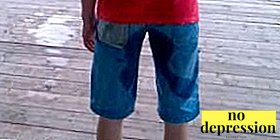 the child is afraid to write: it is worth explaining to the child that if he wants to use the toilet, he should be asked; tell that in no case can not be tolerated, because it is harmful to health; if the child is still small, then you can use diapers;
the child is afraid to write: it is worth explaining to the child that if he wants to use the toilet, he should be asked; tell that in no case can not be tolerated, because it is harmful to health; if the child is still small, then you can use diapers;- the child is afraid to give back: help your child gain self-confidence; to tell that if he is beaten, one should not endure it silently; make it clear to the child that you support him.
From any child fear can get rid. The main thing is to understand what the child is so afraid of, what is the cause of his experiences. After that, it will only help to overcome this fear.
Dr. Komarovsky about night fears and nightmares in children:

 Suggestion. Often, parents can be too emotional to inspire something to the child. For example, that in no case you can not pick up a hot cup, otherwise there may be a burn.
Suggestion. Often, parents can be too emotional to inspire something to the child. For example, that in no case you can not pick up a hot cup, otherwise there may be a burn. 2-3 years. The child is still afraid of losing parental support. Fear of natural phenomena such as thunder and lightning. If during this period the child is tormented by nightmares, then he may be afraid to sleep.
2-3 years. The child is still afraid of losing parental support. Fear of natural phenomena such as thunder and lightning. If during this period the child is tormented by nightmares, then he may be afraid to sleep. Tests: for children and their parents conduct tests that help to identify what fears haunt the child, the level of his self-esteem, whether he is anxious, etc.
Tests: for children and their parents conduct tests that help to identify what fears haunt the child, the level of his self-esteem, whether he is anxious, etc. Stage I - parents or teachers of a child apply to a psychologist with a request for diagnosis;
Stage I - parents or teachers of a child apply to a psychologist with a request for diagnosis; the child is afraid of sounds: make it clear to the child that there is no danger; show the source of the noise, study it with the baby; more often include calm music; do not teach the child to fall asleep in silence, you can turn on the TV, then the baby will not be afraid of even the most insignificant sounds; during the time of noise to behave naturally, it will make it clear that there is no danger; talk more often with the child;
the child is afraid of sounds: make it clear to the child that there is no danger; show the source of the noise, study it with the baby; more often include calm music; do not teach the child to fall asleep in silence, you can turn on the TV, then the baby will not be afraid of even the most insignificant sounds; during the time of noise to behave naturally, it will make it clear that there is no danger; talk more often with the child; the child is afraid of the teacher: at school it often happens that teachers are stern and raise their voice, this frightens the child; you need to explain that there is no way out of school and teachers, if the teacher speaks loudly, this does not mean that she is angry, just because she will be heard better; if talking to a child does not help, then you can try to talk to the teacher;
the child is afraid of the teacher: at school it often happens that teachers are stern and raise their voice, this frightens the child; you need to explain that there is no way out of school and teachers, if the teacher speaks loudly, this does not mean that she is angry, just because she will be heard better; if talking to a child does not help, then you can try to talk to the teacher; the child is afraid to write: it is worth explaining to the child that if he wants to use the toilet, he should be asked; tell that in no case can not be tolerated, because it is harmful to health; if the child is still small, then you can use diapers;
the child is afraid to write: it is worth explaining to the child that if he wants to use the toilet, he should be asked; tell that in no case can not be tolerated, because it is harmful to health; if the child is still small, then you can use diapers;

